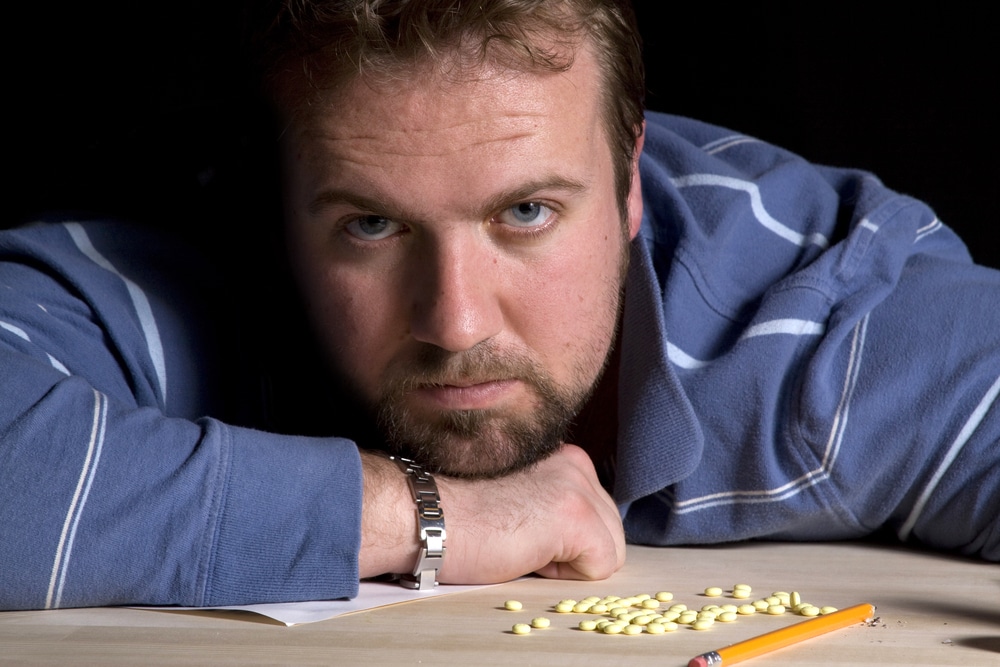
Some prescription drugs are more addictive than others. The addictive prescription drugs affect your brain’s reward system by flooding it with dopamine, a neurotransmitter, that results in a pleasurable “high” that can motivate you to use the drug again and again. This results in a tolerance that can push you to increase your dosage and frequency.
Just because it’s been prescribed, it doesn’t necessarily mean it’s safe for everyone. The more prescribed drugs you have, the more likelihood of the misuse of prescription drugs. The Substance Abuse and Mental Health Services Administration (SAMHSA) conducted a survey in 2015 that discovered that 18.9 million Americans aged 12 and over misused prescription drugs in the past year.
Furthermore, According to the National Institute on Drug Abuse (NIDA) about 1% of Americans 12 and older or young adults had prescribed drug cravings. A problem that keeps increasing, prescription drug abuse may affect all age groups, including teens. The prescription drugs most often abused include opioid painkillers, anti-anxiety medications, sedatives, and stimulants.
The 9 Most Addictive Pills
Opioids
Opioids produce a feeling of euphoria which is why it is one of the most addictive drugs in the market. Opioids exert their pharmacological actions through three opioid receptors:, mu, delta and kappa. These three control pain, reward the brain and promote addictive behavior. Signs and symptoms of opioid misuse include:
- Euphoria
- Lethargy
- Drowsiness
- Confusion
- Dizziness
- Headache
- Seizures
- Nausea
- Vomiting
- Constipation
- Vision changes
- Hard and slowed breathing
- Behavior or personality changes
Oxycodone is usually sold under the brand name OxyContin. It is also sold combined with acetaminophen as Percocet. Its purpose is to change how your central nervous system (CNS) responds to pain. Similar to heroin, oxycodone creates a euphoric, sedative effect. The Drug Enforcement Administration (DEA) revealed that 58.8 million prescriptions for oxycodone were distributed in the U.S. in 2013.
Codeine is one of the opioid pain relievers for treating mild to moderate pain. Sometimes it is combined with other medications to treat symptoms of cold and flu. For instance, it’s commonly found in prescription cough medicines. When codeine is taken in large quantities, codeine-based cough syrups have a sedative effect. Also, it is used as the base for an illicit drug mixture called “purple drank,” “sizzurp,” or “lean.” Sometimes it also contains soda or candy. Some of the effects include sedation and altered levels of consciousness.
Fentanyl is a synthetic opioid and it’s prescribed for intense and chronic pain, usually for people suffering from cancer. The Centers for Disease Control (CDC) reports that it is 50 to 100 times stronger than morphine (the base for heroin). Many times it’s mixed with heroin, cocaine, or both which are already highly addictive. In 2017, the CDC noted that fentanyl is involved in over half of opioid-related deaths across 10 states.
Meperidine is one of the synthetic opioid analgesics often sold under the brand name Demerol. It is usually used to treat moderate to severe pain. The same as other opioids, it produces feelings of euphoria. According to the CDC, 2,666 Americans died in 2011 from drug poisoning involving opioid painkillers other than methadone (a treatment for opioid addiction).
Central Nervous System (CNS) Depressants
CNS depressants include barbiturates and benzodiazepines. Sometimes they are called tranquilizers and their purpose is to have a calming effect, lower blood pressure and reduce anxiety. Some signs and symptoms of misuse include:
- Drowsiness
- Lethargy
- Irritability
- Confusion
- Memory problems
- Dizziness
- Headache
- Changes in vision
- Loss of coordination
- Personality or behavior changes
Alprazolam is a benzodiazepine sold under the brand name Xanax. It is commonly prescribed to treat anxiety and panic attacks. Any drug that depresses your CNS has a calming effect that is good for one’s mental health. It is commonly misused for its quick-acting sedating effects.
The CDC has stated that four times as many Americans died in 2015 than in 2002 from overdoses that involved benzodiazepines. Many of those people died after combining benzodiazepines with opioids. Signs of alprazolam misuse include sleep problems, swelling of the hands or feet, tremors.
Clonazepam (Klonopin) and Diazepam (Valium) are benzodiazepines. They’re used to treat panic and anxiety disorders. They’re also used to treat seizures. Clonazepam is commonly sold under the brand name Klonopin and diazepam is sold under the brand name Valium.
These addictive prescription drugs are often misused for their sedative effects. They can cause “highs” that can feel like the effects of alcohol abuse and drunkenness, talkativeness, and relaxation. It’s common for people to use Xanax, Valium, and Klonopin recreationally and in combination with other drugs. The CDC reports that the number of deaths by opioid overdose involving both benzodiazepines and opioids increased by more than four times between 2002 and 2015. Signs and symptoms of clonazepam or diazepam misuse may include paranoia, hallucinations, constipation.
Stimulants
Stimulant drugs increase your brain activity. By doing that, it helps to increase your alertness and energy levels. Some commonly abused signs include:
- Nausea
- Vomiting
- Euphoria
- Paranoia
- Weight loss
- Headaches
- Dilated pupils
- Hallucinations
- Rapid heart rate
- Vision changes
- Aggressiveness
- Appetite suppression
- Personality or behavior changes
Sometimes known as “speed,” amphetamine is a CNS stimulant. It’s commonly used to treat Attention deficit hyperactivity disorder (ADHD) and narcolepsy (a sleep disorder). Medications that contain amphetamine are commonly abused for their energizing effects.
Adderall is a medication that contains amphetamine and dextroamphetamine. It is often used by people who tend to be sleep-deprived such as truck drivers, college students, shift workers, and people who work on deadlines which makes it highly addictive. A University of Michigan study in 2012 reported 9% of college students misusing Adderall. Additional signs of amphetamine misuse also may include increased energy and alertness, increase in body temperature, raised blood pressure, rapid breathing.
Like Adderall, methylphenidate is a stimulant that affects your nervous system. It is commonly sold under the brand name Ritalin. It also increases the amount of dopamine in the brain, which also helps improve mental health and attention. And also like Adderall, it is used to treat ADHD and narcolepsy. And like other stimulants, it can be addictive.
One of the reasons that Ritalin and other drug stimulants are so misused is their availability. The DEA reported that more than 13 million prescriptions for methylphenidate were filled in 2012.
What Is Prescription Drug Misuse?
Misuse of a prescription medicine means:
- Taking medication in a manner or dose other than what was prescribed.
- Taking someone else’s prescription, even if for a legitimate reason such as pain.
- Taking medication for the single purpose to get high or feel euphoria.
The term “nonmedical use” of prescription drugs also refers to these types of misuse. There can be serious consequences for prescription drugs misuse. Increases in misuse are seen in:
- Increased visits to emergency rooms
- Overdose deaths related to addictive prescription drugs
- Admission to treatment programs for prescription drugs use disorders
- Overdose deaths that involved prescription opioids were five times higher in 2016 than in 1999.
Common Signs of Prescription Drug Addiction
- Stealing, forging, or selling prescriptions
- Taking higher doses than prescribed
- Extreme mood swings or hostility
- Decrease or increase in sleep
- Poor decision-making
- The appearance of being high, unusually energetic, or sedated
- Continually “losing” prescriptions or requesting early refills so more prescriptions must be written.
- Getting prescriptions from more than one doctor.
Long-Term Effects of Prescription Drug Abuse
The long-term effects of prescription medicine abuse vary depending on the type of drug a person uses. If a person is abusing opioid painkiller prescription drugs, the individual may experience the following symptoms and issues:
- Physical Dependence and addiction. Your body adjusts to the presence of the drug
- Withdrawal symptoms start when you reduce or stop using the drug
- Depression
- Low levels of testosterone, lower sex drive
- Tolerance occurs, which means long-term users must use larger or more frequent doses to achieve the euphoric effect.
- Reduced energy and strength
An individual who is abusing depressant drugs may experience the following effects as a result of prolonged use and abuse:
- Severe CNS depression, which can lead to delirium or coma
- Substance use disorder (SUD) which takes the form of addiction
- Tolerance can also develop with these drugs.
- Individuals addicted to CNS depressants should not try to stop taking them on their own. Substance withdrawal can be severe and possibly life-threatening.
Long-term stimulant substance abuse can lead to the following problems:
- Tolerance
- Severe Depression
- Brain damage
- Malnutrition and weight loss
- Liver, kidney, and lung damage
- Damage to blood vessels of the heart and brain
- SUD can take the form of addiction in severe cases
- High blood pressure can cause heart attacks, strokes, and death
Withdrawal Symptoms From Prescription Drug Use
Opioid Withdrawal
Individuals addicted to opioids usually develop symptoms when they stop using them. Those symptoms may include:
- Chills
- Irritability
- Runny nose
- Sleep disorders
- Excessive sweating
- Digestive problems
- Cravings for the drug
Withdrawal from CNS Depressants
When you stop using CNS depressants, you will probably experience these symptoms:
- Panic
- Nausea
- Anxiety
- Headache
- Muscle pain
- Drug cravings
- Sleep problems
- Sweating excessively
Stimulant Withdrawal
If you have become addicted to stimulants you might have withdrawal symptoms which may include:
- Anxiety
- Cravings
- Depression
- Extreme fatigue
- Suicidal thoughts

How Can You Prevent Prescription Drug Addiction?
There are a few things you can do in order to prevent prescription medication abuse. Firstly, you can ask your care provider or pharmacist about addiction medicine. This is especially important if you aren’t sure of its effects. Also, make sure you always keep your provider informed about all medications you take. This includes over-the-counter medications.
Be sure to read the information provided with the medication before you start taking it. Make sure you always take your medications as prescribed as there may be harmful consequences. (Do not take more than prescribed or use it more frequently than you should.) Keep all prescription medications secure at all times and always dispose of any unused medications properly. Finally, early recognition of a prescription medication problem and early intervention may stop it from turning into an addiction.
Treatment For Prescription Drug Addiction
Many years of research have shown that substance use disorders are brain disorders. And they can be effectively treated. However, treatment depends on the type of drug used and the needs of the individual involved. Successful addiction treatment needs to include several elements including:
- Detoxification
- Medication
- Counseling
Support of friends and family members
Treatment for Opioid Use Disorder
Detox–Opioid withdrawal lasts for hours or days and sometimes weeks. It depends on which drug you were using, how long you used it, and how much. Many people opt for a detox program to help ease the initial symptoms of withdrawal. Withdrawal symptoms are a major reason for relapse.
Medication–Medications used to treat opioid use disorder include:
- Methadone
- Buprenorphine
- Naltrexone
These medications can prevent other opioids from having an effect on the brain which helps avoid relapse.
Counseling–Experts say that psychological and social factors are the main causes that push people back to using. Lifelong therapy to stay opioid-free usually involves counseling and “talk-therapy” programs. Counseling programs also help discover the reasons for substance abuse in the first place, including a possible mental disorder.
Treatment for CNS Depressant Addiction
Detox–As mentioned previously, do not attempt to detox from CNS depressants on your own. Withdrawal is severe and needs to be accomplished with medical supervision.
Medication–There are no medications for CNS depressant addiction. However, withdrawal from CNS depressants needs to be done by tapering the doses over a period of time, and with medical supervision.
Counseling–Talk therapy such as cognitive-behavioral therapy which focuses on adjusting the patient’s thinking, expectations, and behaviors has been used successfully. Additionally, it helps the individual learn skills for coping with the stressors of life and preventing relapse. Counseling can also help uncover a co-existing mental disorder, a common cause for substance abuse.
Treatment for Addiction to Prescription Stimulants
Detox–Detoxing from stimulants is done by tapering the drug dosage to help ease drug and alcohol withdrawal. Supervision is helpful to ensure the patient is actually tapering off.
Medication–There are no FDA-approved medications for treating stimulant addiction.
Counseling–Individual and behavioral therapies are effective for treating stimulant addiction. It’s important to discover what may have caused the drug abuse. It’s possible there is an underlying mental condition. This is known as a dual diagnosis.

When To Seek Help
Do you think that someone you care about is misusing prescription medications? Are you being affected by your drug use? It’s important to get professional help. At Behavioral Health Centers we understand your feelings. We have experience in these situations. Please remember, we are trained to help you, not judge you. Contact us now about our treatment options before the abuse or addiction leads to more serious problems.







